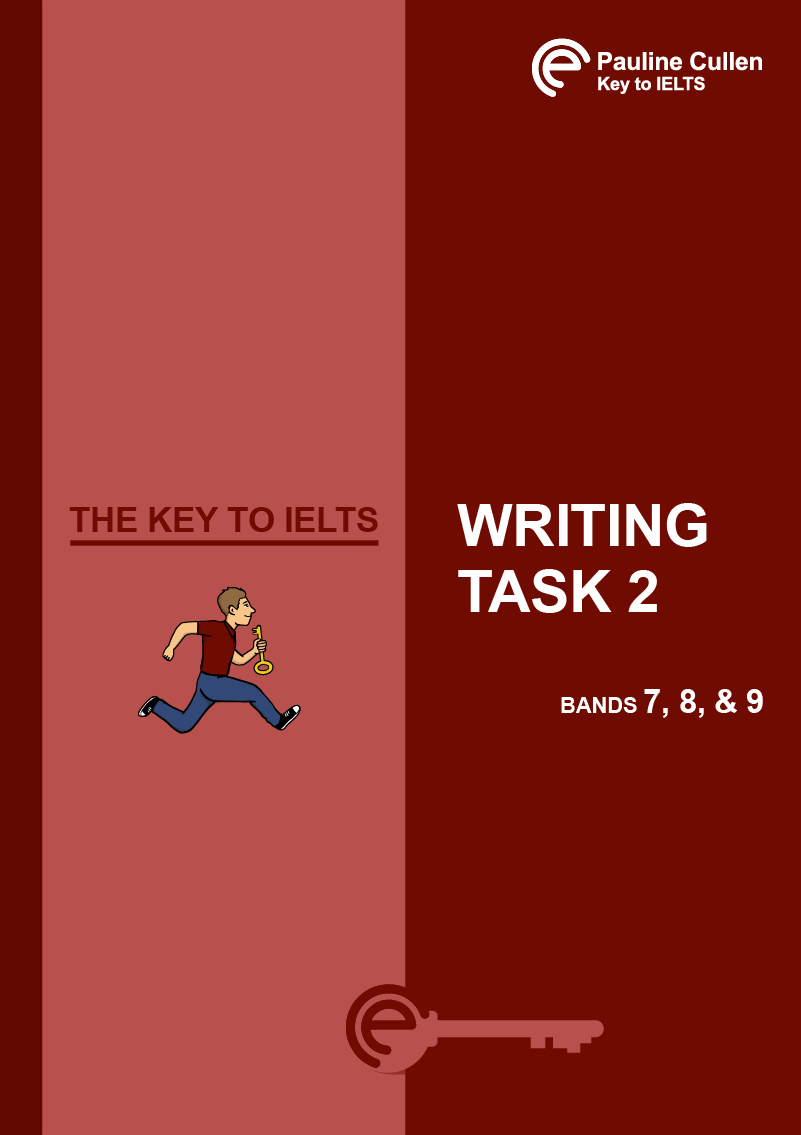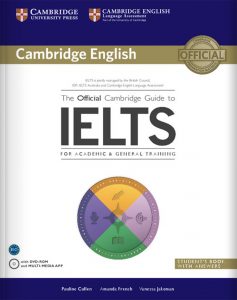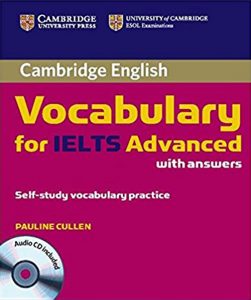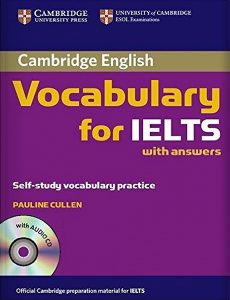Discussing Problems and solutions and advantages and disadvantages
I am often asked ‘How should I answer questions about problems and solutions, or questions where we need to say whether the advantages outweigh the disadvantages?” The questions I’m asked often focus on numbers: ”How many paragraphs should write? Can I write about just one advantage and one disadvantage?”
If you have read my free book, The Key to IELTS Success, then you will know that:
1) focusing on numbers is not a good idea, and
2) there is no special way to answer any question ‘type’ – all of the IELTS writing task 2 questions are marked according to the same criteria.
This means that you must always
- Address all parts of the task
- Respond to the question with relevant ideas that are extended and well supported, and
- Present a clear position throughout.
We know this because the Task response criteria for bands 7 to 9 tell us this.
From the criteria for Coherence and cohesion, we also know that you must organise your ideas into logical paragraphs so that your argument progresses in a logical way.
So, if your question presents an issue and then asks you to discuss problems and solutions, then you will need to 1) discuss any problems you can identify and 2) suggest solutions to these.
The way that you organise your ideas will always depend on the issue you are presented with in the question and your own personal feelings and response to that issue.
You may decide to
- Introduce the topic and the issue
- Discuss the main problems
- Discuss the possible solutions to these problems
- Reach a conclusion about the problems and solutions.
Or, if you are a more confident writer, you may decide that it is better to
- Introduce the topic and the issue
- Discuss a problem and a solution to that problem
- Discuss a further problem and a possible solution
- Reach a conclusion about the problems and the solutions.
There is no single correct way to answer.
Similarly, if you are given an issue and then asked ‘ do the advantages outweigh the disadvantages?’, you could organise your essay like this:
- Introduce the topic and the issue
- Discuss the advantages
- Discuss the disadvantages
- Reach a conclusion about whether the advantages outweigh the disadvantages.
Alternatively, you might decide to write about the disadvantages first. The only thing that matters is that you
- think about what you will write
- present your ideas in a way that is logical (and that)
- makes your position clear.
What do we mean by ‘the advantages outweigh the disadvantages?’
This question simply asks you to consider and discuss both the positive and the negative sides of an issue, then decide which ‘side’ you believe is more important. In other words, to decide whether you are prepared to accept the disadvantages because the advantages are so great. A good example is cheap air travel – this can be uncomfortable, but many people are prepared to accept this for the greater advantage of traveling long distances quickly and relatively cheaply. So, for many people, the advantages of cheap air travel outweigh the disadvantages. However, others may disagree. They may feel very concerned about the environmental impact of air travel and so, for these people, the disadvantages outweigh the advantages.
When you are explaining a position that you genuinely hold, and that is based on your own experience, it is much easier to present a logical argument. Problems can occur when people do not stop to think about their position and write simply to complete the task and focus only on ‘how many ideas/paragraphs’ they are writing. As a result, their argument is not logical and so their position and their conclusions are not clear.
For example, one essay sent to me by a follower of my page concluded that the advantages of sharing scientific research far outweighed the disadvantages. The main advantage he identified was that having access to information meant he could advise younger members of his family and help them to make career choices. He then explained the main disadvantage: that a nuclear disaster had almost occurred near his home because of information being shared carelessly. I am sure you can imagine that his paragraph about the nuclear disaster showed that the disadvantages were in fact terrible, and his paragraph about the advantages was not very clear or persuasive.
I suspect that this writer had not really thought about the issue and that he had simply written ‘I believe the advantages far outweigh the disadvantages’ in his introduction and conclusion because this was a template he had learned.
Learn about writing a ‘balanced’ essay discussing both sides in this type of essay: Writing a counter argument
The Official Guide to IELTS and my two Vocabulary books also show you how to organise and write about common topics in writing task 1 and 2. You can buy my books here:







Hi Pauline, I hope everything is going well with your new book. I have some questions about the IELTS writing and I’d appreciate it if you could help, because I don’t know any other reliable sources. My first question is about this topic from IELTS Cambridge 10;
Countries are becoming more and more similar because people are able to buy the same products anywhere in the world. Do you think this is a positive or negative development?
In order to achieve a 9, do I need to talk about both the positive and the negative aspects of this development even if I think it has only negative effects? I’m asking this because in your free book you said for higher scores we need to look at both sides of an argument; can I say I believe this is only a negative development and only mention the negative effects and still achieve a 9?
How about a question that asks whether the advantages outweigh the disadvantages? Can I say that in my opinion there are no disadvantages and only mention some advantages? Would that still qualify for a 9?
Hi Lock, the answer is in the Task Response criteria for bands 6 and 7. This tells us that, for answers at band 6 ‘some parts may be more fully covered than others’ while a band 7 answer ‘addresses all parts of the task’ If you omit the negatives then you are ignoring part of the question. If you cannot see any negatives at all, then you would need to explain this so that you are not ignoring it altogether. It would be even better if you could discuss the negatives but explain why you think these are not so bad. Can you really not see any negative effects of being able to buy the same products everywhere in the world? As I explain in my book, to get ideas, think of how this affects your local area – what about local businesses? How does this affect you or others when you travel?
Hi Pauline,
Thanks for the reply. A sample answer is written by an examiner at the back of the book (and I assume this is a 9). However, no positive aspect is mentioned, and the examiner says that this is LARGELY detrimental to culture and traditions. I actually expected to read some of the negative effects this development could have, because “largely” does not mean entirely, and so I expected some discussion of the positive effects, but there is no such thing, can you explain why?
If you read the post I have linked to below, you will see that model answers are not helpful in establishing what you must do – this is because a native speaker who is a professional writer can address the criteria in very subtle ways. I haven’t read that sample, but it is a mistake to look at samples like this and try to work out a way to answer. There is no single way, the answers are written simply to show the question can be answered and there is not always a commentary to help. My new book will help to address this. Here is the post: https://keytoielts.com/model-answers-and-the-invisible-ielts-band-10/
I totally understand that and I have read your post about using samples before. My question is, regardless of what the examiner has written, can I state it clearly that I can’t see anything positive in this, and then go on to talk about the negative aspects? And if yes, is that true for a “Do the advantages outweigh the disadvantages question?”? (I hope you don’t see it as me insisting on my point)
No, not at all, I do understand that you are simply trying to get a clear idea. Why not send me an answer to this question that follows the plan you are suggesting here, and then I can answer more easily. One other point to make is that you say ‘the examiner has written’. Don’t assume that an examiner wrote an answer unless you are told that. Another key point is that test writers may not be examiners and test writers are often asked to write sample answers. Examiners are not test writers and are often not professional writers – we don’t expect that food critics are great chefs.
I understand that, but the book says this sample is written by an examiner as an example of a very good answer. I will definitely send an answer based on the plan I told you. and by the way, if the question asks us to discuss the causeS of and solutionS for (plural) an issue, and we only discuss one solution or cause, will that mean a lower task response even if I say I believe there is only one solution to a problem? I read this on a website that claimed to have been written by an examiner that when asked to discuss the advantages/disadvantages or causes/solutions, and we only discuss only one advantage/disadvantage or only cause/solution, this reduces the task response to a 5 since this is addressing the question only partially. Is this true?
Ok, I just wanted to point out that many people assume answers are written by examiners and that examiners are also trained writers and test writers.
Thanks, how about what I read about task response on that website? Is that true?
Which website do you mean?
It was in an earlier comment I posted. I’ll repost it:
“If the question asks us to discuss the causeS of and solutionS for (plural) an issue, and we only discuss one solution or cause, will that mean a lower task response even if I say I believe there is only one solution to a problem? I read this on a website that claimed to have been written by an examiner that when asked to discuss the advantages/disadvantages or causes/solutions, and we only discuss one advantage/disadvantage or cause/solution, this reduces the task response to a 5 since this is addressing the question only partially. Is this true?
Firstly, I can’t speak for other websites because I don’t know those people and their experience or qualifications. Anyone can claim to be an examiner, in fact, examiners are not allowed to say that they are examiners on public forums such as a website. I would only listen to a senior examiner when it comes to making pronouncements like that. Personally, I do not believe that if someone argued very convincingly that, in fact, there was only one possible cause and only one possible solution that they would not achieve a high score in task achievement. I imagine that what this person meant by their comment was that you should not simply write about one problem/cause/solution or one /advantage/ disadvantage as it is highly unlikely that there is only one and doing that would result in an essay that is likely to be repetitive and possibly even too short.
Secondly, again, examiners are not test writers. Test question writers are very careful to make sure that plurals are only used when necessary. Can you honestly think of an issue with only one advantage/disadvantage/problem/solution etc?
My point is that there are many many ways to approach an answer to a formal discursive essay. Looking at how a band 10 native speaker does it will not help you to understand what is possible for yourself. It just isn’t helpful in my view. What I am aiming to do in my next book is show you how to fix band 6-6.5 writing to create band 8 or 9 responses.
Yes, that’s true, thanks for your help.
No problem at all.
Hi Pauline,
Is it possible to just have two body paragraphs, and discuss one MAIN problem/advantage in one body paragraph and one MAIN solution/ disadvantage in body paragraph two?
Thanks,
Are you asking about whether you need to write about advantageS and disadvantageS and about problemS and solutionS (plural not singular)? If the question asks for more than one then this is what you must write about.
Hi Paulin,
But you’ve already asserted that IELTS writing is not about numbers!
That’s correct. But if your task is to discuss ‘advantages’ and ‘disadvantages’ you only mention one, without explaining why, then you are not completing the task. My comment about numbers is that it is wrong to focus on how many examples; long words; complex sentences; etc. etc. you use. Just communicate clearly – but do answer the task you are given.
Hi Pauline,
I have read all your IELTS advice about writing, I have also read all of your books including your free book, but somehow I am still confused. When the question asks us “to what extent we agree or disagree with something”, and I completely agree with it, can I simply present my reasons for agreement, or do I also HAVE TO present the reasons why some other people might disagree and refute their arguments?
I know that presenting the opposite view and refuting it is one way to develop an argument, but my question is if this is obligatory for someone who wants to be a 9? I really appreciate your help, you’re the only reliable source that I can refer to.
Hi Lianaa, if you look through previous posts you will find a post about this and if you read chapter 7 again I do talk about this in that chapter. The main problem occurs when people are given 2 viewpoints and then choose to only talk about the one they agree with – you must not do this because then you are missing half of the question. If you are given only one viewpoint, then you can just explain your own agreement or disagreement if you are skilled enough to do that without repeating yourself. However, many candidates who are stuck at band 6 do not have the language skills to do this without repetition, which is why I recommend talking about both sides (why you agree and why you don’t believe the opposite). This allows you to talk about the whole issue in a balanced way and prevents repetition. The issue only occurs when there is one view given in the task.
Many thanks gor your detailed answer, actually I’ve read all your books and I’ve been following your blog for a long time, but I have never come across a question where there are two points of view and it asks us to what extent we agree or disagree, I thought when there are two views the question asks us to discuss both views and give our own opinion, do you have any examples for a question that has two views and asks us how much we agree or disagree?
Hi Lianna,you are correct to a certain extent. My worry is that people try to put their own limits on what is possible within a test question and this then becomes a problem if their test question does not fit within these limits. This problem is then compounded when people put their own limits on what or how you ‘must’ write (especially the incorrect advice that you ‘must only write about the opinion you agree with’. To illustrate their advice, they often write their own test questions. For example I have seen the following shared as ‘a recent actual question’ with the date and city also given: ‘In many countries, prison is considered the best way to decrease crime. However, education is often argued to be a more effective way. Which opinion do you most agree with?’ I can tell you that this is NOT an authentic question – it is a good example of people changing questions to make their own point. These questions then circulate around the internet as ‘proof’ and people use them as practice materials. If I change this question like this: ‘Some people believe that prison is not a good way to prevent crime and that education is more effective’ Can you see that it is possible to write more than one opinion within a statement and that both / all ideas must always be discussed no matter what the question following the statement looks like? I hope this makes my advice clearer.
I really appreciate it that you take the time to reply. Now I think I understand what you mean by two points of view. Do you think this question from Cambridge book 11 falls under the same category? “Governments should spend money on railways rather than roads. To what extent do you agree or disagree?” So here I should talk about both railways and roads even if I think governments should only spend money on roads? Am I right in thinking that? And the question I had at the beginning was if I think spending money on railways is a waste of money, do I HAVE TO reject this viewpoint after presenting its argument? I mean is this refuting the side that I disagree with necessary for someone who wants to achieve 8 or 9?
Yes, I have seen essay that only talk about or discuss railways in their answer and do not mention roads. If you agree that more money should be spent on railways then you would need to explain 1) why the railways deserve / need this money and 2) why roads do not You can’t simply refute the argument without discussing or mentioning the other side. You must discuss everything mentioned.
I’m sorry if I’m asking too many questions, but unfortunately there are only 5 pages in both your vocabulary books about writing and I couldn’t find the answer in the official guide either. when the prompt presents two viewpoints and the question asks us to discuss both views and give our own opinion, when I entirely agree with one viewpoint, do I also have to refute the other side of the argument in the paragraph where I present its argument, or should I simply present the argument FOR both views and say which one I agree with? I’m asking this because the band descriptors say that my position should be clear throughout, and honestly I don’t get it when the question wants me to discuss both views and give my own opinion, whether I need to present the argument for proponents of both viewpoints and then give my own without refuting the side I disagree with or should I reject one side if I agree with the other?
(I’m sorry for a long question and many thanks for your help)
No problem at all Lianna. I explain this point in greater detail in my free book: The Key to IELTS Success. You’ll find it in chapter 7. You’ll also find information about how the language you use helps to convey your position (read chapters 3 and 4 for this). You won’t find the information in my earlier books because I was not aware that it was a problem until I began being told on social media problems about the different myths circulating regarding IELTS writing task 2. If you don’t have it already, you can find the link to the book here:https://keytoielts.com/product/ielts-teacher-the-key-to-ielts-success/
Hi again Pauline,
I couldn’t reply your last comment so I’m writing a new post. Actually I have read your free book 3 times, and I am clear on the fact that I must discuss both views, but unclear about my discussion of the view I disagree with. I also know that I can show my disagreement through my use of language or by saying it directly, my question is whether I need to both present and refute the side I disagree with or should I simply present both sides (without refuting any) and then state where I stand on the question? For instance, in this question from Cambridge books: “Many people think that every individual is responsible for their own healthy lifestyle. Others believe that governments should take care of it. Discuss both views and give your own opinion.” If I simply write an essay such as:
Introduction: ……………. It’s the responsibility of every individual to look after their health.
Body paragraph 1: On the one hand, some people think that this responsibility lies with the government. These people believe ……………..
Body paragraph 2: On the other hand, I think it is our responsibility as individuals to look after our health ……………..
Conclusion: individuals not the government
So in the first body paragraph I have merely represented the arguments for the side I disagree with, and in the second body paragraph I have presented the arguments for the side I agree with (and I have made it clear by saying “I think”)
Now in order for this essay to score 8 or 9, do I need to change the tone of my first body paragraph so that it shows my disagreement or simply presenting my own opinion in the second body paragraph (without refuting the other side) is enough?
(I’m so sorry for asking many questions again, but I couldn’t find any model answers for discussing both views from you in your books)
Hi Lianna, why not write out this essay and send it to me so that I can be clear in making the point? It is always easier to understand an idea when using real language examples. Essentially, yes, the language you use to discuss the side you disagree with should make your disagreement clear. This is not only language but also the way that you present the ideas. Again, if you send me your answer I can demonstrate this.
I definitely will. Thank you so much for your help.
hi Pauline
I really appreciate your efforts to clear each and ever doubt students have in their minds.
my question is about CONCLUSION.Do i need to re-state my main ideas in the conclusion if so then isn’t it repetition?
some people say that students shouldn’t write anything new in the conclusion like any suggestion, is it true?
Thanks
Hi Karam, a lot of the confusion comes from the fact that you will always find examples that are different to the ‘rules’ you are given. The truth is that there is no one fixed way to write an essay. However, there ARE conventions that you should follow until you are at a level where you can break those rules (which is what skilled professional writers can do). With your conclusion, the convention that I teach is that you should sum up your main argument (which is your overall main idea) and make your conclusion clear. Too many conclusions I see consist of only one sentence – I don’t believe this is enough – you should aim to write at least 2 sentences. Those who lack language skills will simply repeat the same ideas and the same words, if you are band 7 or above, you will be able to sum up your ideas without repeating them (I am teaching this in my Key to IELTS Writing Workbook)
Hello Pauline,
Cambridge 10 WT2 on Page 129:
[Some parents buy their children a large number of toys to play with.
What are the advantages and disadvantages for the child of having a large number of toys?]
How should this question be approached? In the task, it is not specifically asking to give your opinion on whether advantages outweigh the disadvantages. But to keep a clear position throughout the response, it is natural to be inclined towards advantages or disadvantages. Please suggest, Thanks.
As I explain the chapter 7 of The Key to IELTS Success, you must always answer the question based on 1) The task you are given and 2) The criteria used to assess your answer. The Task response criteria makes it clear that you must always give your position. With a question like this I would give my personal view in the conclusion.
Thanks.
Hello Pauline
Going through your blog was really enlightening I have a question.
This is regarding essays with question type
Do the advantages outweigh disadvantages??
Firstly,Can we write 2 paras for the advantages and one for the disadvantages to clarify the position??
Secondly,if we see the disadvantages more than the advantages can we take the opposite stand. In other words can we write more disadvantages than the advantages??
This post might help:https://keytoielts.com/do-the-advantages-outweigh-the-disadvantages/
Hi Pauline,
I saw about your wrist on your Facebook page, I’m sorry about that, I hope you get well soon.
I asked a question under a more recent post, but I didn’t get a reply. Should I post my question here or you can’t answer questions until 7 weeks later?
You can post it here – I will try to answer hen I can – typing is tiring so I cannot give long answers.
Hi Pauline,
In a task such as “Discuss the advantages and disadvantages” or “Do the advantages outweigh the disadvantages?”, would we loose mark if we talk about only ONE advantage and ONE disadvantage?
This post will answer that:https://keytoielts.com/do-the-advantages-outweigh-the-disadvantages/
Hi Mam,
I can hope you are perfectly alright.
Could you please review my essay and give you an expert opinion on it?
Some people prefer to live in a house, while others feel that there are more advantages to living in an apartment.
Are there more advantages than disadvantages of living in a house compared with living in an apartment?
Presently, few people believe that living in a house is a better idea. However, some others argue that living in an apartment would be very beneficial for them. There are a number of reasons why living in a house is always a good decision. So, that’s right living in house has more advantages that I will discuss in forthcoming paragraphs.
There could be several reasons why people prefer to live in houses. Primarily, when you live in a house, you feel a sense of ownership because you do not need to worry about paying rent and other multiple fees to third body. For instance, if someone is living in a house, they just care about their own premises, as they are the sole owners of their houses. Infact, if something got damaged in their house, they really do not need to pay any external authorities that will charge them in terms of depreciation. Moreover, you are responsible for any major wear and tear in your house. Mostly, people prefer to fix all those things on their own. Thus, people tend to live in the houses.
Furthermore, people feel more comfort and peace in their life when they live in their own house. Because they are not concerned about answering to anyone about anything, they feel more confidence in their personal life. Also, you are not bound to obey any rules and regulations like people living in apartments have to face routinely. For example, a fixed parking space is allocated to each tenant in parking lots and they need to park their vehicles there, but house owners can park their cars in garages. Infact, they park their cars right in front of their house and no one would ask them about it. So, people find it useful about living in a house.
In conclusion, I would like to say that people who are living in houses are blessed with countless benefits as they are independent in their respective premises. Also, they are expected to respect the general rights of people living nearby. But they do not need to worry about extra expenses at all like tenants have to bear on a daily basis.
(353 Words)
Hi Mohsin, I don’t have time to give detailed feedback right now but your main problem seems to be that you have misunderstood the question. You seem to believe that living in a house is the same as owning a house, and that living in a flat means only renting. So, your discussion is about owning V renting. In fact, you can own or rent a house or a flat. The question is asking about which it is better to live in. Also, be careful not to change the meaning of the question – the first sentence of your introduction is different to what the question states (few = not many, which is not the same as ‘some’)
Thanks a lot, mam for your insightful review.
Your points are very helpful for me, and I have not got any sort of good feedback so far.
So, does my essay lack relevant ideas if I am not wrong?
For such an essay, what could be more suitable and relevant ideas?
Any suggestion please?
Thanks.
Kind Regards,
Mohsin.
Hi Mohsin, you have effectively changed the question to: ‘Some people think it is better to rent a flat, other people think is it better to own a house.’ These are both very different propositions. Because of that, your answer has more issues than a lack of relevant ideas. Always answer the very specific question you are given and spend time thinking before you begin writing.
Thanks a lot, Mam.
I would be very careful for the next time. And I really appreciate the way you gave me in-depth feedback.
Stay blessed mam and take very good care of yourself!
Hello Ms Pauline,
In response to a question like that “Do the advantages outweigh the disadvantages?”, when should I state my opinion unreservedly (e.g. I believe that)? in the conclusion only? or in both the introduction and conclusion?
Read chapter 7 of The key to IELTS Success – I discuss this in detail there.
Thanks for your reply.
I have read it, but I would appreciate if you could give me a short (and direct) answer :).
I would really recommend you re-read the chapter. It isn’t enough to read the book once – you need to read, process, re-read, then apply the ideas in your practice. There isn’t always a short, simple answer to complex issues and I do discuss this in detail in chapter 7.
hye, Pauline mam
mam, may i use weaker modals to show opposite side and strong modals to show my possition in paragraphs, if question asks my opinion
Can you give me an example? I’m not sure what you mean by weak and strong modals.
Hi, Pauline. I wonder if I need to say which outweighs which every time – since sometimes I feel both advantages and disadvantages are great, and I think both are of equal weight. Can I say that in the IELTS writing?
Hi Thomas, you need to answer the question – it doesn’t matter what your response is, only that you answer it. In other words, it can be ‘x outweighs y’ ‘Y outweighs X’ or ‘actually I think they’re as bad / good as each other.’ Just don’t ignore it.
That’s clear to me. Thank you.
What a valuable piece of advice… It answered my questions in details… Thanks
Hello Pauline,
Could you please explain how I can make my position clear when answering questions related to advantages and disadvantages as well as questions where I need to explain both points of views?
I looked at a sample writing you posted, but it was only explaining only one stance where you either agree or disagree, and I quite understand how this works here. However, in questions like “advantages and disadvantages” are where I struggle.
My imagination is that if I agree that the advantages outweigh the disadvantages, I kind of dedicate a paragraph for the advantages and how I agree with them and a paragraph explaining the disadvantages and how I believe they are less important in the same paragraph. Afterwards, I follow this up with a conclusion where I state my opinion clearly.
Is this how it should be done? Or should I explain the advantages and disadvantages with a neutral stance before stating my opinion?
Thank you so much
Hi Hazem, my new course shows you how to do this step by step and explains where you are going wrong. I take you step by step through the writing process from getting ideas, to planning, then writing and checking. I also show you how to make sure your position is clear throughout. I will be sharing a link to the course very soon.
Hey Pauline, can we use counter arguments in do the advantages outweigh the disadvantages essays?
in the first paragraph, I can write about the advantages (2 ideas)
in the second paragraph I can write about one disadvantage and then present a counter argument.
how does that sound?
Yes, that’s a good plan – as long as you make it clear that this is a ‘counterargument’ and not something you agree with (the most common problem I see). My new book outlines the main problems and shows how to address them.